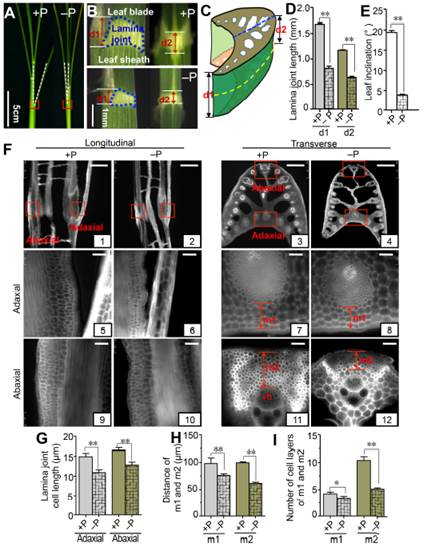

中国农业科学院研究团队经过多年研究,揭示了土壤磷肥状况影响水稻叶片直立性的分子机理,为设计培育高产水稻品种提供了理论基础。
上部叶片直立的水稻品种能够通过合理密植提高单位面积光合效率和养分利用效率,实现水稻高产。水稻生长需要大量磷元素,因此土壤磷素肥力不足,易导致水稻叶片直立成“一炷香”状,分蘖减少,最终导致减产。
土壤中的磷素易被固定而难以被作物吸收,水稻田间生产目前主要通过大量施加磷肥来克服这一问题。这不仅提高了农业生产成本,还增加了过量磷肥随水土流失导致的水质污染风险。因此,解析土壤磷素肥力状况调控水稻叶片直立性的机理,对于培育磷高效利用且耐密植水稻品种尤为重要。
中国农业科学院农业资源与农业区划研究所的易可可、阮文渊、郭美娜和徐磊等人研究发现,SPX1蛋白、SPX2蛋白与RLI1蛋白形成了一对相互抗结的调控模块。这个调控模块能够响应土壤磷素肥力状况,影响水稻叶枕(叶柄与叶鞘的连接区域)细胞的伸长,调节叶枕大小,最终影响水稻叶片直立性。
研究人员表示,这一研究成果有助科学家根据不同农业生产的需求,设计出不同株型且对土壤磷素肥力变化敏感或不敏感的水稻品种,最终达到田间生产过程中减少施加磷肥、增强养分利用效率的目标。
研究论文已发表在新一期美国《植物细胞》网络版上。(来源:新华网 杨超伦)
An SPX-RLI1 module regulates leaf inclination in response to phosphate availability in rice
Abstract Leaf erectness is one of the key traits of plant architecture; in grains, plants with upright leaves can be planted close together, thus benefiting yield/unit area. Many factors, such as hormones, affect leaf inclination; however, how nutrition status, in particular phosphate (Pi) availability, affects leaf inclination remains largely unexplained. Here, we show that in rice (Oryza sativa), Pi-deficiency stress inhibits lamina joint cell elongation, thus restricting lamina joint size and inducing leaf erectness in rice. The Pi-starvation induced proteins SPX1 (named after Syg1/Pho81/XPR1) and SPX2 play a negative role in the regulation of leaf inclination. We further identified an SPX1-interacting protein, Regulator of Leaf Inclination 1 (RLI1), which positively regulates leaf inclination by affecting lamina joint cell elongation in rice. The rli1 mutants showed reduced leaf inclination and the RLI1 over-expressors showed increased leaf inclination. RLI1 directly activates the downstream genes BRASSINOSTEROID UPREGULATED1 (BU1) and BU1-LIKE 1 COMPLEX1 (BC1) to control elongation of the lamina joint cells, therefore enhancing leaf inclination. We also found that Pi-deficiency repressed the expression of RLI1. SPX1 protein interacts directly with RLI1, which could prevent RLI1 binding to the promoters of downstream genes. Therefore, SPX and RLI1 form a module to regulate leaf inclination in response to external Pi availability in rice.
原文链接:http://www.plantcell.org/content/plantcell/early/2018/04/02/tpc.17.00738.full.pdf



